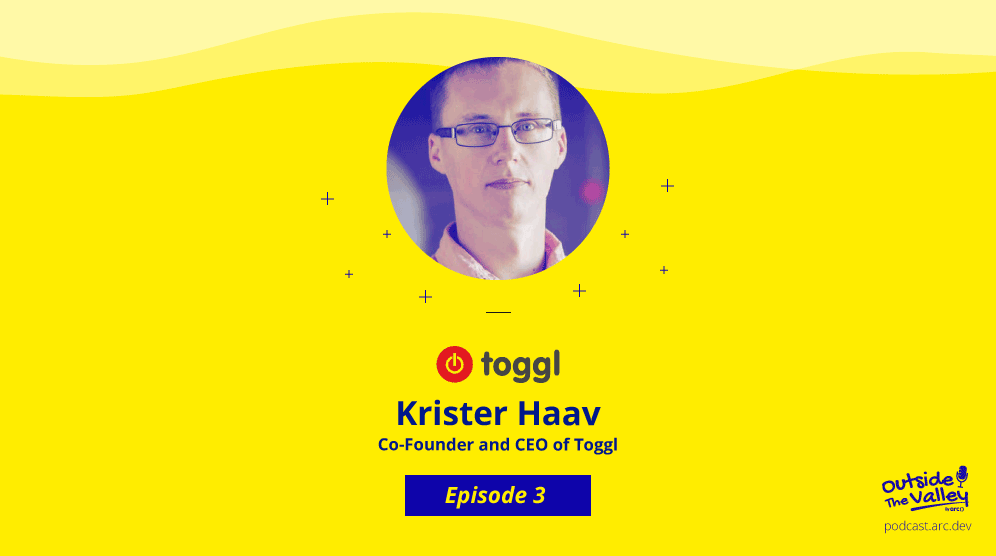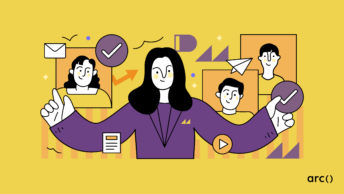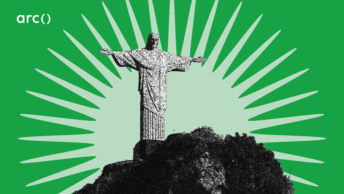I would say that if you want to go remote, you have to take the plunge. So you cannot dabble into being slightly remote because the worst thing that you will do is that, you have someone working together in the office and then one person working somewhere else, because that means that you will still have a lot of communication happening within the office.
Today on the show we have Krister Haav, the CEO of Toggl, a simple (yet powerful) time tracker that helps you learn how much your time is worth. If you’re familiar with Toggl, you’ve probably already noticed that they have a super playful brand. They’re not afraid to experiment with comics, or even this addictive startup simulator game.
In this episode, we discussed how Toggl evolved from a software consulting company to a product company, the importance of brand authenticity for remote companies, and why playfulness is an important element of Toggl’s culture.
I had a very fun chat with Krister, and there’s a blooper at the end. So you can skip directly to the end, OR listen to the whole episode, maybe learn a thing or two, and then get to the blooper. Up to you!
If you’re enjoying the podcast, please consider leaving a review on iTunes!
The podcast is also available on your favourite players: iTunes, Google Podcast, Castro, Overcast, Spotify, Stitcher, Player.fm, and Tune In.
Follow us on Twitter to get updates.
Topics covered on the podcast episode:
- 07:23 — Why “playfulness” is important to Toggl’s culture
- 11:51 — Does brand authenticity = a higher employee retention rate for Toggl?
- 13:51 — How Toggl “transfers the vibe” of team culture within the organization
- 20:45 — The hiring and onboarding process at Toggl
- 35:45 — Is it possible for remote teams to hire for potential?
- 40:13 — Krister’s advice for companies who want to start hiring remote employees
Mentioned Resources:
- Teamweek
- Hundred5
- Krister’s Toggl page
- Toggl Unicorn Startup Simulator
- 5 Ways to Have Killer Meetings
- What We’ve Learned Building a Remote Culture by Nick Francis
Full transcript:
Jovian: Hello world, welcome to third episode of Outside the valley podcast where we interview remote startup leaders, workers, remote work advocates, and companies who thrive outside of Silicon Valley. This is a podcast where remote companies share what works and what doesn’t so you can do it right. Outside The Valley is brought to you by Arc, the all in one remote hiring platform that enables companies to easily hire remote software engineer and teams. I’m your host, Jovian Gautama.
Today’s show we have Krister Haav have the CEO of Toggl, a simple yet powerful time cracker that helps you learn how much your time is worth. Now, if you’re already familiar with Toggl, you’ll notice that they have a very playful, authentic and fun running. So we talked about that.
We also discussed how toggle evolved from a software consulting company to a product company. The importance of brand authenticity for my company’s why playfulness is an important essence within Toggle and how toggle keep their culture fun.
I had a very fun chat with Krister, and there’s also blooper at the end. So you can skip directly to the end or listen to the whole episode first, maybe learn a thing or two, and then get to the blooper. Hope you enjoy this episode. And here we go. Krister, welcome to the show.
Krister: Hello, and I’m really welcome right now. Thank you.
Jovian: So just to start, can you share a bit about yourself and the history Toggl.
Krister: Okay, actually, to start with Toggl I have to really really start from long time ago, because before Toggl there was actually a local Estonian Software consultancy company. So we built all kinds of software. And we actually started way back in year 2000 already.
So we did all kinds of software, custom software for different companies. And as we had many projects ongoing all the time, we had this issue that we didn’t really know where we’re spending our money. Or actually, we’re spending our time. So we would be losing money on that.
So we started looking for a solution to track time, but unfortunately, in early 2000s there wasn’t any good solution. So we of course, being a software company built our own. And we really struggle as a totally free product in Beta in year 2006 already, but that was kind of just like a hobby for us. We didn’t really think of it much I would say. We got the couple of thousand users. We were pretty happy.
Whenever we had some time we just played around with it. And then in year 2008, when the big financial crisis hit, it actually hit us really really hard because we lost pretty much like 50% of the revenue overnight. And then we had a situation that we had a room full of engineers doing nothing. So then we actually took the decision that hey, we have this thing called Toggl which no one actually has long before and we have some users on it so let’s I don’t know build on it.
Jovian: Why is it called Toggl by the way?
Krister: It’s an interesting one because we just took a random name generator and used it and we got I think like some 20 options or so but this one had a kind of the best way to it.
Jovian: Super catchy.
Krister: Yeah super catchy. It’s like Google, Toggl. Come on, they are not alike. But from 2009 onwards, we have been more like a product company and it actually started growing really, really fast. So in 2011, we actually decided to ditch all the softer side of consultancy side of things. And from 2012 we have been purely a product company.
So basically, Toggl actually has three birthdays in a sense, so 2006, 2009, 2012 and up until this time, we were purely like a local company. We had office in Tallinn. We had people working from there, and well, pretty much like normal as things go. But the thing about Estonia is that it’s very, very small place. All in all, it’s like 1.3 million people, the whole country. So and there are many startups in Estonia, many engineering companies around here and also many big companies are also like from all over the world.
And that means that the kind of engineering skills are really, really hard to come by. And for us, it was a big problem because whenever you started hiring someone, it just took months and months to get someone. And most of the times you got someone who is junior or who didn’t know anything, or didn’t have the skills required, and so on and so on.
And then one day, we had this weird idea that, hey, let’s do a test. Let’s do an online test. And so we did that in year 2014.
We built our own first online test to really harness this kind of I would say global workforce, because then we actually, envisage that yes, this is the way to go because we don’t want to stay in this tiny market of one million people. We want to go to the market of one billion people.
And we put the test online. We advertised it in Facebook actually, friends and family and everything like this. And we got over 100 candidates for that. We hired one guy, first remote guy. And he actually was from Estonia. But he’s a remote guy, and he was our first remote guy.
Jovian: So basically, Toggl just started hiring remotely since 2014.
Krister: Yep.
Jovian: And how many team members do you guys have now?
Krister: I think that 2014 we still have something like 15 people, less than 20 anyway. I can’t remember exact numbers. But now with Toggl and all the other siblings we have, I think we have past 100 people mark.
Jovian: Wow. And how many team members are working on Toggl?
Krister: I think latest count is 77.
Jovian: Yes so far dear listeners here if you don’t know already so Toggl actually has sister companies, quote unquote, which are called Hundred5 and Teamweek, which we will probably touch a little bit more later on.
Krister, kind of want to continue the conversation about the Toggl brand. Okay. If I go to your block and to your author page block.toggl.com slash author, slash Krister Haav, there is your this your face here, and it says Krister has no programming background whatsoever, which is why he’s good at bossing the rest of us around.
So this is really funny, and especially since you are the CEO, and it’s interesting because that’s why I think Toggl is a fun brand really. And a startup brand usually reflect the personality of the founder or co founder. And you are the co founder and you were to product lead, right? And I would assume that the current Toggl rent is the extension of your personality. Is this true or not?
Krister: To an extent, yes. Because I’m not the only one. But basically, we are just two of us. Two of the co-founders have been going for it for a long time. But I would say that it’s still that kind of the brand image. It kind of reflects what we do, because it’s actually true because I have never done any programming in my life like for my living because yes, I know how to write programs and stuff but I really suck at it. So I don’t do this for a living.
Jovian: You just boss people around.
Krister: Yeah, I do boss people around. Yeah. Because that’s what I’m really good at.
But yeah to be on the kind of more serious side then I would say that currently the Toggl brand does reflect on our personality as well. Because I refuse to take life too seriously. Because it’s hard enough. So I would say that yes, there is still some playfulness within the brand as well. If you check our latest marketing stuff, we have the Mr. Toggl is jumping around and doing weird stuff. So I’d actually say that I say that.
Jovian: So Toggl has this playfulness and fun in the culture. Do you take this into consideration when you’re hiring for culture fit for engineers, marketers and so on?
Krister: Yes, definitely.
Because the culture fit is, I think probably the most important thing after or even before skills because you can teach skills but you cannot teach personality.
I would say that this is really, really big part of what we are actually testing when we do our hiring, because our hiring is not just like online test. It’s actually quite long. Because for example, if you hire someone, and that pretty much is any position is that we have this online test when we have we might have thousands of candidates, but we do whittle it down to a manageable number of people.
So I would say when we started out with 3000 people, probably no more than 20. And out of that, we will do the first video interviews to really see are they really the ones that they say that they are and also ask like difficult about their skills and so on. But then we always conduct a test week as well. So that means that you have to work with the people for a week as well.
With a team, you’re being hired to. And with that, you will see a lot of the kind of personality traits as well. And yeah, there would be another interview with me as well. So it’s sorry for all the candidates because there will be a lot of interviewing, but the thing is that we only conduct the latter phases with the number of people will go down anyway. So I would say that the ones that already arrive at test week, they’re done really, really well.
Jovian: Got it. So getting back to the brand authenticity and the brand culture here. Do you think that remote companies or distributed teams like Toggl and we have other examples like Buffer and so on. Do you feel like when you’re a distributed team, you need a stronger brand authenticity and identity more than ever for the sake of higher retention rate?
Krister: You mean like, employee rate?
Jovian: Employee, yes, exactly.
Krister:
Yeah, employee retention, I would say that definitely, you have to be really upfront what you really are, and you cannot do nice marketing texts on your website, and then the real life will be different.
So I would say that, for us, it’s pretty much what you see or read about us on the website. It actually does apply. So yeah, I would say that you have to be really, really transparent on what you are and what you provide and I think that for really getting all these new young people millennials and everyone really have to be fun because they don’t want to go to boring old place.
Jovian: Right. Kind of want to move onto the team culture. Since most of your team members are distributed and sometimes it’s not easy to get the vibe quote unquote if you know what I mean compared to when you are in the same office having lunch together and once you kind of know how this is the feel quote unquote of the team. It’s slightly harder when you are not in the same place. And for Toggle, how do you guys transfer again quote unquote, the vibe of the culture when you are remote?
Krister: Very valid question and I think this is kind of really going now into this kind of essence of being a remote company. Because for us, yes, we are remote company.
We all work from our homes or co working spaces or whenever, wherever, because I’m in my kitchen right now. But it’s the thing that you really cannot like forget that people are still made to be together. So they have to have these relationships with each other.
And for that we actually what we have done and how we I think have overcome this problem is that we are actually meeting our team face to face because there are two company wide meetings each year. We bring people together, like one will be here in Tallin kind of in home of Toggl but the other one will be somewhere like totally, I will say random event because we have been all over the world but the thing is that we will bring everyone together.
And we’ll do work together. We’ll have fun together. For example, the one that I said, the one that’s kind of traveling the world. This one is called Toggl challenge. And the idea is that we bring people together, we then shuffle the team into small teams, and then they each have a task that they have to deliver during the week. That means that the you have to have really, you have to collaborate with people.
And most probably, these are the ones that you actually are not doing every day. So that means that you might have CEO working with the accountant and the designer and they have to do a Toggl product or hiring video, for example. Or this year, for example, we did Instagram ads. The whole whole whole company just did that.The whole company just did that.
Jovian: The whole company did Instagram ads?
Krister: Yeah, but then that was hilarious because that’s the thing that you actually will meet people you have this whole week together you have to really put your effort into that and do something cool and crazy and whatnot.
Jovian: Right. So there is the accounting team will help the developers and designers do Instagram ads.
Krister: No. One accountant.
Jovian: One accountant.
Krister: And one… yeah exactly. So that’s this is the thing that we take everyone out of their comfort zone. And basically they will just have to do stuff that they don’t normally do. So the designer might do something like on Instagram videos, but probably they don’t shoot them. So then right now they just use their phones and went all over the place and did some clips here and there and then and that’s that’s how it works.
So you have to work together. And that means that we had a whole week for people to really know each other and then have fun, as you said we will have lunches together, we will have party together, we have our dinner together and everything like this.
So the main thing is that it’s really really important to start relationships in person, face to face like in person really. Because that way it’s really easy also to carry it on remotely because you know the people behind the screen.
You know them, you know their jokes, you know what food they like, and then how fun it is to, I don’t know, run up and down the hills in Lisbon, for example, trying to get this perfect shot. So this is the kind of main the main thing for me at least and for Toggl in general because we bring people together so that they will refresh their relationships. And that means that it’s a lot easier for them to continue working remotely.
Jovian: So Toggl has this startup unicorn game, was it the result of the outings of the company retreats?
Krister: Close because I told you that there are two company wide meetings each year but there will be also two additional ones with the with our own team, or if someone wants to join as well some other team. And this unicorn game actually was born during a team meetup of marketing and front-end team. So they sat down together did a lot of copywriting and nice design work. I like the eight bit style. And also the music. There’s a one front end guy actually did all the nice Atari style music and everything.
Jovian: So for listeners are not familiar with Toggl startup unicorn game, just Google it. It’s a very, very fun game, especially if you’re deep into the tech world. I lost so much productivity in the office when it was launched. My high score is 619 million try to beat that.
Krister: So the goal is to get to like a billion. I can tell you I haven’t reached that yet.
Jovian: Yeah, but I really liked it. Like the jokes everything is on point. Getting back to the collaboration part of this game itself, because you mentioned it happened when the front end team met up with the marketing team, right? But it’s still something that happens when you meet in person.
Do you think with the, the rise of new remote tools, and more best practices out there, do you think this is something that eventually companies can emulate even though in a full distributed team situation?
Krister: I would say that I don’t know about these kind of things because they probably needed a lot of beers and obscene amount of laughing as well. But I don’t know how much you can do that over the video. But I would say for example, our product development only happens over the video. So yes, this the kind of day to day work definitely can be done. I would say that fun stuff maybe it’s better to do in person because it’s more fun that way.
Jovian: Exactly. Especially if you’re laughing right sometimes oh, sorry. I didn’t get the joke. Can you repeat it again, then it’s not funny. So for now, kind of want to move on team management and meetings. Let’s start with the onboarding process first, Your first article you mentioned that for new team members, you will fly them to Estonia and work together with the team for two weeks I think. Are you still doing that now?
Krister: A week or two.
Jovian: A week or two.
Krister: Yeah, the thing is that we really haven’t done it anymore because even the student team is now remote. So it’s no use of flying someone in to Tallinn when there’s no one to meet them. But yeah, we do this still from time to time.
When we get a batch of people then we do bring them in, and then we also make an effort and then go see them and work with them and so on. But I would say that it would be really, really great to bring them in still because it really helps when you get this kind of face to face contact on your first weeks.
But as I said that, since right now we do have Tallinn office, but maybe in the near future, we don’t have it anymore. So we will be fully remote. We don’t have anything at all. That means that we probably have to find some other way to do these things.
But I would say that even when people join, it actually isn’t too long until they will get to meet their own team or even the whole company in person. So we’ll try to manage but I would say that for the people we have done this in the past so that we brought them in right after the join, it did help.
Jovian: Kind of want to move on meetings. So back in 2006 oh my God, September 25, 2006. You wrote a blog post about five ways to have killer meetings. If you wrote this last week, and you posted it like yesterday, it is still very, very relevant, which means people aren’t getting better at meetings. Why do you think that is?
Krister: I don’t really know why that is. But I would say that this is kind of the biggest issue by far for people. Because it’s so easy to actually waste the time in a meeting.
I’ve seen it in the past as well, because as I said, we were working as a software consultancy company and that meant that we had awful lot of meetings with all the clients and everything. And sometimes you wish that you were back in the office and doing the actual work and not sitting there because it’s totally pointless sitting there and listening to some rambling for two hours. But the thing is that the kind of like things that you mentioned from the article, they’re still valid, because you still have to have an agenda.
You still have to have some kind of a written summary to it. And you still have to have some kind of conclusion to the meeting as well. And I would say that if you go remote, they’re kind of doing this kind of killer meeting as I said. They will be even more important because on call, while they can be doing work or doing something more fun, because with remote teams there’s a big thing that you really, really have to keep in mind.
The time zones. Because Toggl actually spans the whole globe. We have people from Australia. I don’t know Malaysia, India, Africa, Eastern Europe, Western Europe, Brazil, East Coast US, West Coast US. I think we had someone in Hawaii.
So that’s the thing that we span all the kind of time zones. And that means that if you want to have these really good meetings, then you have to be on point you have to time limit them. And you have to have really clear agenda, what you do. And you really have to put the effort into that. And I would say that one of the things that I’m really strong advocate of is that I still do believe in video calls.
If you want to do a meeting, do a video call, because that way you still can see people and that will help tremendously to get the message across.
Jovian: Do you guys have some kind of set meeting guidelines?
Krister: Not really because we do have some rules and some I would say pointers. They’re not global. They’re not Toggl specific. But they’re team specific because each team has still the freedom to find a way that works the best for them.
Jovian: Okay. Well, the team leader set this rules for their own team?
Krister: Yep.
Jovian: Okay. That’s interesting. In your opinion, what is the most important principle when you run me?
Krister: Number one, be on time. That makes really makes sense. And then second one is actually also that it’s actually necessary to have an agenda. And it would be good if you also have this kind of a question or a thing that needs to be answered. So basically, the outcome you define what you want to get out of this meeting in the end, and that way, you can do quite effective meetings or efficient.
Jovian: Exactly. So I do think when you are a distributed team, just like you mentioned. You guys have different team members spanning across different time zones. And when the culture is set, you will be more appreciative towards the other team members time and then you will be on time and then you have to prepare okay, I don’t want to spend his or her time it’s pretty late their time or something like that.
Krister: Yeah, exactly. So it might be that people from far east they might have, for them, it’s like, already like nine o’clock in the evening. And someone from California, it might be 6:00 AM for them. So you have to really be on point and try to get through it as efficiently as possible.
Jovian: So I’m going to move on to the topic of hiring. Remote jobs are really popular nowadays because they offer and most of the remote company has a great team culture and they really appreciate your time just like Toggl did. But also, it comes where the risk of you having thousands of applicants who are probably not that qualified just because they can’t. This sounds bad, but because they can’t. If I’m based and I’m based in Taipei, Taiwan now, I can definitely apply for a remote companies based in New York or San Francisco and so on.
So there’s this increase in noise, in terms of application and you did mention that you create this tool, right? You create this online tool to do this filtering, which is as far as I know, it’s called now it’s its own company, Hundred5. Can you share a bit more about that? And then why did you guys decide, okay, this product needs to be its own company?
Krister: I would say that when we started remote hiring, it was a very simple online test, but people still, it had some resources put into that, and we used it internally I think for three or four years. And the thing about internal projects is that they never get the resources that are necessary for them to really be developed. And since we saw that the whole hiring world as it is right now with the HR departments and shifting through the CVs and everything like this. This is actually horribly broken.
As you said, there I don’t know, hundreds, thousands of people who would apply to your job and how do you actually go through it with traditional means? And for that, you need some kind of automated solution. And that’s why we actually built the tool that is right now Hundred5 to actually limit the number of people you have to really look into. And that means that we do the test.
Krister: It has to be sufficiently hard so that only I don’t know 5%, 3% of people will pass and we only deal with these 3% of people so that we know that these are not skill wise. They are not these kind of like what you said the ones that taking up space or thinking of time so I would say that really works.
The other part of your question was that when we or why we got the idea that we have to really build a new product, I told you that because internal projects, never get the resources. But it works like this because what we did is that we took the decision that yes, we do want to improve this tool further. But that means that it has to have its own focus, it has to have its own team behind it in a sense because for me, for example, me I kind of do that.
Because I’m full on working for Toggl. I have to make sure Toggl is up to structure and does whatever it does. So the product team. Product team also work for Toggl. They don’t actually have resources or they don’t have time to actually think about the Hundred5 situation.
So that means that what we did that we actually created the company and they have well, the same things basically. All the product related stuff is separate from Toggl. So that means that both the product teams are different, development teams are different. And also the management teams are different.
What we are only sharing, they do use our office right now because it makes sense. And we are also sharing the financial department and legal department because that’s very kind of general. But all the product related stuff and support is totally separate.
Jovian: Do they also have company retreats that are similar to Toggl? Like biannual retreats and then meetups every couple of months?
Krister: The biannual one, they do have. And actually, for example, this year, they also will be joining the overall kind of total family. So it will be a family reunion this year.
Jovian: That’s interesting. So in terms of hiring since you are the co founder of Toggl I bet you previously were the product. And there’s this thing about hiring product managers in distributed teams. Even though you hire people from around the world, but usually when comes to product leads or product managers, you want to hire people in a same time zone or doesn’t have as much difference with the main stakeholders like the CEO or director for engineering and so on. So in my opinion, if you’re a product manager, actually your option to work in distributing is slightly limited compared to other positions. Do you agree to this?
Krister: I would say that I necessarily don’t agree with you.
Jovian: Okay.
Krister: Because in my opinion, it can be overcome. Definitely one thing is that half of it was true because you don’t want to have too much time difference so that like you said that you’re from Taipei probably wouldn’t work if you want to work for like California companies because there’s so little overlap in your time. So that would be very, very hard.
But for example, I would say that for us the like the product lead, a new product lead is actually also from Estonia, but it’s just like it was because he was promoted from within. He was not hired. And that actually made sense because he had the most knowledge of it already.
But for example on team leads, because arguably team leads are as important because these are the ones that I’m actually doing my work basically, they are my team. They can be from anywhere, for example, our front and team leader is from Brazil. And that means that there’s like, I don’t know what six hour time difference with me.
Jovian: Probably.
Krister: And it works.
Jovian: So and interesting when you mentioned that the current new product lead is like promote from with it. So I saw an article back I think from Nick Francis from Help Scout. He actually mentioned that when you are a remote first company in your distribute company, it’s actually really hard to hire for potentials. You usually out there looking for the people who kind of already good at what they’re doing with their skills.
Krister: They have to have skills. Yeah.
Jovian: Do you agree with this?
Krister: Yes or no? Because one thing is that we definitely need to have skill set right away. Because otherwise it doesn’t make sense to hire them.
Jovian: Yeah, definitely.
Krister: But the second part is also important and that will be the kind of team cohesion part, also the team culture. So culture fit as you said before. So this one is actually very, very important. And for us, it also means that we always look for people who are willing to evolve as well. So they are actually willing to take on more responsibilities, take on new initiatives, and maybe pimp up their career that has happened as well.
Jovian: Right. Yeah. So yeah, that’s interesting because I think there are some scenarios if you are a, even though you’re a very smart person with potentials, but you’re just out of college for example, it’s really hard for you to get a job promote companies on unless you have several years working in a normal companies first. You kind of know what you’re doing and then get hired by remote companies.
Krister: We actually have a couple of people who are fresh from the Uni.
Jovian: Yeah, that’s interesting.
Krister: For a couple of people Toggl was the first job ever. The thing is that it’s not only like, the actual working or actual jobs, but it’s also what you have done in the past. So these people have been mostly programmers, of course, but they have been active in the past as well and done some kind of open source stuff for side projects or doing their own kind of built their own game or something like that. So they know actually what to do.
Jovian: Okay.
Krister: Yes, they didn’t turn the living with it, but they did things. And they actually did excel with the skills test, and they actually also passed the personality phase of it. So I would say that it’s possible. It’s what you are and what you do so, yeah.
Jovian: That is interesting. So in this couple of years, we’ve seen the rise of remote work. For Toggl itself since your product is basically one of the, I’ll say one of the most prominent remote tools out there. Especially if you are a freelancer, remote developers, want to track your time. And again, if you are a freelancer developer, you want to log out for your client, then you’ll use Toggl. You see a rise of new users in this couple of years since remote was getting more and more popular.
Krister: I would say that it’s not even like remote work as such, but the way people work is changing overall. Because one thing is that the well, the thing that everyone wants to like really focus on is the remote work. But you can’t actually say that this is the only reason because what we’re also seeing that a lot of people are self employed now because they do want to control their own time and that means that they’re actually acting like small companies on our on themselves. So they also have several projects they will be working on or several clients they will be working on. And then actually they do need means of seeing where they spend their time on.
Because a lot of people don’t want to do one thing. They want to be in the office from nine to five. They want to use cool stuff, they want to do, I don’t know, develop mobile games in the morning and paint Japanese paintings in the evening, and have fun on the beach during lunch time. So that means that they want to have this flexibility. But on the other hand, they need to also be productive because that’s what all the employers want from them.
And that means that they have to be really also knowledgeable of the time as well. And Toggl is there to help them.
Jovian: That’s fantastic. So for the last question for this interview, do you have any advice for companies that is considering to hire their first remote team members?
Krister: This is probably a bit controversial now.
But I would say that if you want to go remote, you have to take the plunge. So you cannot dabble into being slightly remote because the worst thing that you will do is that you have someone working together in the office and then one person working somewhere else because that means that you will still have a lot of communication happening within the office.
Informal one or even formal one and that means that the person being remote is not part of the company, in a sense, and that means that well, it’s kind of a thing that you cannot be like slightly pregnant, you either are or you are not. And the same goes with remote.
You are remote company or you aren’t remote company.
And that means that you always have to treat everyone remote as well, remote or in the office pretty much the same. For example, when we had video calls, most of the times, even when people were in the office, they went to separate rooms and had their own out because that means that they will be also kind of acting remotely for others and that means that everyone is in the same footing. And that means that you can actually employ all these remote work principles.
So have video calls, write summaries and never discussed stuff, either like in person or somewhere behind the scenes. So it has to be kind of public all the time. Not everyone has to join your meetings, but at least there has to be summary that you will publish them and people who who need to know about that they will get the information and that’s how it should be.
Jovian: Fantastic. So Krister thank you so much for your time. I learned a lot from this interview, and well hopefully, the listeners also learned new things on how to manage remote teams. And again, like you mentioned how to hire your first remote team members.
Krister: Yeah, I will say that it’s not going to be easy for people who are having established companies and only now starting to go into all this remote or distributed team thing. But from my experience, I will say this is a lot of fun.
Jovian: For you guys who are not familiar with Toggl, check it out. It’s toggl.com and if you like it say hi to Krister. Probably via email or something like that. Anyways. Cool. Thank you so much Krister.
Krister: Thank you and have all the best. Bye. Bye.
Jovian: And that’s it for another episode of Outside the valley brought to you by Arc. We created this podcast with the hope that in each episode, you can learn something new from other remote startup people. So if you have any feedback or suggestions, please don’t hesitate to reach out to me at Jovian at arc dot dev. It’s JOVIAN at ARC dot DEV. Or you can find us on Twitter @arcdotdev. See you next week with another episode of Outside the valley and ciao.
Blooper:
Krister: Sorry.
Jovian: It’s okay.
Krister: My fridge just started living.
Jovian: I thought it’s your pet.
Krister: No, it’s a fridge.








